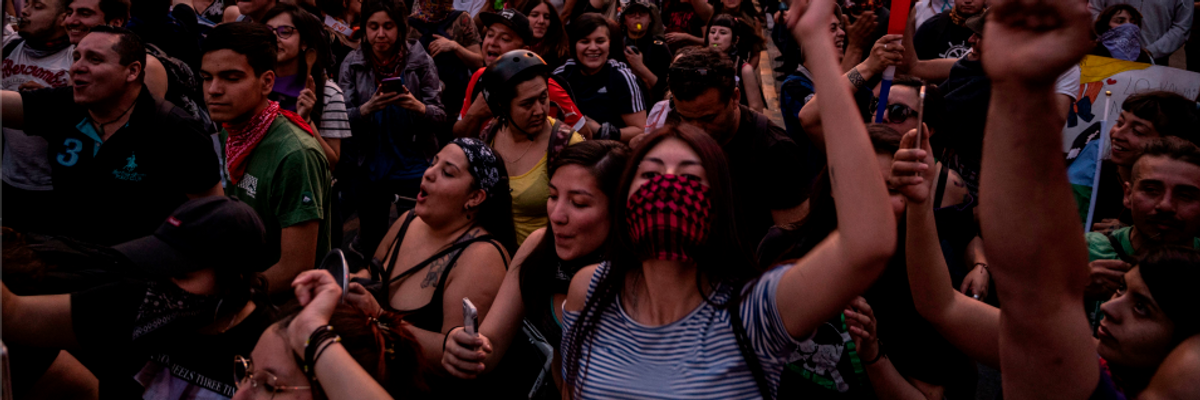The demonstrations which have exploded in recent months around the world are focused on a number of issues, including climate inaction, economic crises, and government corruption--but the protests share at least one thing in common: they're being led by young people who have spent the first two decades of the 21st century watching their governments prioritize corporate profits over the needs, rights, and futures of working people.
As Jack Shenker wrote in The Guardian on Tuesday, demonstrations in countries including Chile, Lebanon, Iraq, Haiti, Spain, Hong Kong, and Ecuador are being led by "the children of the financial crisis" of 2008, which came to a head in the U.S. with the Wall Street collapse and had long-term effects on economies around the world.
The young people demanding an end to austerity and the pressures of neoliberal capitalism have "come of age during the strange and febrile years after the collapse of a broken economic and political orthodoxy, and before its replacement has emerged," wrote Shenker.
"One direct impact of the crash has been a rapid diminishment of opportunity for millions of young people in rich countries--who now regard precarious work and rising inequality as the norm," he added. "All this has produced a generation charged with hopelessness and hope."
"One direct impact of the crash has been a rapid diminishment of opportunity for millions of young people in rich countries--who now regard precarious work and rising inequality as the norm. All this has produced a generation charged with hopelessness and hope."
--Jack Shenker, The GuardianYoung people are refusing to tolerate austerity measures in countries like Chile and Lebanon.
Lebanese Prime Minister Saad Hariri was forced to resign Tuesday after two weeks of demonstrations that began earlier this month after the government announced new austerity measures, including a tax on WhatsApp calls.
Lebanon's austerity plan came in reaction to an economic crisis marked by rising prices on goods and what protesters view as a raiding of public funds by government officials. The public quickly responded with the largest demonstrations in Lebanon in nearly 15 years. An estimated one million people marching to demand an entirely new political system--one focused on serving all Lebanese people and less concerned with sectarian divisions.
"The politicians told us that we hate each other, but we don't. I'm from a specific sect. My friend is from a specific sect," a 23-year-old protester told the New York Times last week. "But we're all here together for our futures and our children's futures."
"We need a whole new system, from scratch," added another demonstrator.
A transportation fee hike was the catalyst for mass protests in Chile, where students and other young adults responded to the new fees with an organized fare evasion campaign.
Chile has the lowest salaries of any OECD country, and the new public transportation fees were announced as working people were facing difficulty affording basic living costs.
On Friday, a reported one million Chileans--over five percent of the country--demonstrated in Santiago.
As Common Dreams reported earlier this month, the peaceful demonstrations in Iraq, in which dozens of people have been killed by security forces, grew out of anger over rising unemployment, especially among young people, in a country where a majority of the population is under 30.
"The whole political elite needs to change because the current system has done nothing for us," one demonstrator told Al Jazeera.
Along with the global grassroots movement Extinction Rebellion, young activists including Swedish 16-year-old Greta Thunberg have spent more than a year mobilizing young adults in the fight against another casualty of neoliberalism: the accelerating climate crisis.
Climate action advocates are demanding world governments end support for fossil fuel companies whose carbon emissions are contributing to pollution and rising sea levels. Instead, protesters argue, governments should invest in renewable energy to rapidly bring climate-warming emissions to net zero and ensure that today's young adults have a future.
Thunberg, a leader of the Fridays for Future school strike movement and last month's Global Climate Strike, took world leaders to task at the U.N. recently for promoting "fairytales of eternal economic growth."
In the U.S., the Sunrise Movement has pressured more than 100 members of Congress to back a Green New Deal to shift to renewable energy economy and provide green jobs for all Americans who want them.
Announcing plans for a nationwide climate strike in December on Monday, the Sunrise Movement slammed the U.S. government for "[selling] our futures to the highest bidder."
"Our generation is saying enough," the group tweeted. "We're showing up louder and stronger than ever before to say that our futures will not be sacrificed for corporate money."
